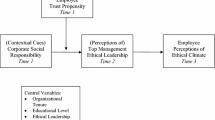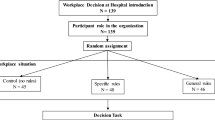Abstract
We examine the perceived importance of three organizational preconditions (awareness of formal ethics codes, decision-making techniques, and availability of resources) theorized to be critical for ethics program effectiveness. In addition, we examine the importance of ethical leadership and congruence between formal ethics codes and informal ethical norms in influencing employee perceptions. Participants (n=418) from a large southern California government agency completed a survey on the perceived effectiveness of the organization’s ethics program. Results suggest that employee perceptions of organizational preconditions, ethical leadership and informal ethical norms were related to perceptions of ethics program effectiveness. Based on these findings, organizations should evaluate the presence (or absence) of essential preconditions and take steps to ensure that leaders model espoused organizational values to foster perceptions of effective ethics programs.
Similar content being viewed by others
References
Ashkanasy N. M., Falkus S., Callan V. J. (2000). Predictors of Ethical Code Use and Ethical Tolerance in the Public Sector. Journal of Business Ethics 25(3): 237–253
Bartels R. (1967). A Model for Ethics in Marketing. Journal of Marketing 31:20–26
Baumhart R. C. (1961). How Ethical are Businessmen?. Harvard Business Review 39:5–176
Beck S. (2002). Ancient Wisdom and Folly. World Peace Publications, Ojai, CA
Bennis W., Nannus B. (1985). Leaders: The Strategies for Taking Charge. Harper and Row, New York, NY
Blasi A. (1980). Bridging Moral Cognitions and Moral Action: A Critical Review of the Literature. Psychological Bulletin 88:1–45
Cavanagh G. F., Moberg D. J.,Velasquez M. (1981) The Ethics of Organizational Politics. Academy of Management Review 6(3):363–374
Clark M. A., Leonard S. L. (1998). Can Corporate Codes of Ethics Influence Behavior?. Journal of Business Ethics 17(6):619–630
Clark M. M.(2003) Corporate Ethics Programs Make a Difference,but Not the Only Difference. HR Magazine 48(7): 36
Cohan J. A. (2002). “I Didn’t Know” and “I was Only Doing my Job”: Has Corporate Governance Careened Out of Control? A Case Study of Enron’s Information Myopia. Journal of Business Ethics 40(3):275–299
Cohen J., Cohen P., West S. G., Aiken L. S. (2003). Applied Multivariate Regression/Correlation Analysis for the Behavioral Sciences, 3rd edition. Lawrence Erlbaum Associates, Mahway NJ
Cronbach L. J. (1951). Coefficient Alpha and the Internal Structure of Tests. Psychometrika 16:297–334
Ethics Officer Association (1999). Unethical Workers and Illegal Acts. Society 36(4):2–4
Ferrell O. C., Gresham L. B. (1985). A Contingency Framework for Understanding Ethical Decision-making in Marketing. Journal of Marketing, Summer 49:87–96
Ford R., Gray R., Landrum R. (1982). Do Organizational Codes of Conduct Really Affect Employees Behavior?. Management Review 71(6):53–55
French P. A. (1984). Collective and Corporate Responsibility. Columbia University Press, New York, NY
Griffis S. E., Goldsby T. J., Cooper M. (2003). Web-based and Mail Surveys: A Comparison of Response, Data, and Cost. Journal of Business Logistics 24(2):237–258
Hays S. W., Kearney R. (2001). Anticipated Changes in Human Resource Management: Views from the Field. Public Administration Review 61(5):585–597
Hegarty W. H., Sims H. P. (1979). Organisational Philosophy, Policies, and Objectives Related to Unethical Decision Behaviour: A Laboratory Experiment. Journal of Applied Psychology 64(3):331–338
Hoffman J. J., Grantham C., Lamont B. T. (1998). The Effect of Firm Profit Versus Personal Economic Well Being on the Level of Ethical Response Given by Managers. Journal of Business Ethics 17(3): 239–244
Hood J. N. (2003). The Relationship of Leadership Style and CEO Values to Ethical Practices in Organizations. Journal of Business Ethics 43: 263–273
Hunt S. D., Vitell S. (1986). A General Theory of Marketing Ethics. Journal of MacroMarketing, Spring 8:5–16
Jones G. E, Kavanagh M. J. (1996). An Experimental Examination of the Effects of Individual and Situational Factors on Unethical Behavioral Intentions in the Workplace. Journal of Business Ethics 15(5):511–523
Kanungo R. N., Mendonca M. (1996). Ethical Dimensions of Leadership. Sage Publications, Thousand Oaks, CA
Kohlberg L. (1969). Stage and Sequence: The Cognitive-developmental Approach to Socialization. In: Goslin D. A. (eds), Handbook of Socialization Theory and Research. Rand McNally, Chicago, IL
Korsgaard M. A., Brodt S. E., Whitener E. M. (2002). Trust in the Face of Conflict: The Role of Managerial Trustworthy Behavior and Organizational Context. Journal of Applied Psychology 8(2):312–319
McDaniel C. (1997). Development and Psychometric Properties of the Ethics Environment Questionnaire. Medical Care 35(9):901–914
McDonald G., Nijhof A. (1999). Beyond Codes of Ethics: An Integrated Framework for Stimulating Morally Responsible Behaviour in Organisations. Leadership and Organization Development Journal 20(3):133–146
Mendonca M. (2001). Preparing for Ethical Leadership in Organizations. Canadian Journal of Administrative Sciences 18(4):266–276
Nwachukwu L. S., Vitell S. J. (1997). The Influence of Corporate Culture on Managerial Ethical Judgments. Journal of Business Ethics 16(8):757–776
Posner B. Z., Schmidt W. H. (1984). Values and the American Manager: An Update. California Management Review 26:202–212
Posner B. Z., Schmidt W. H. (1992). Values and the American Manager: An Update Updated. California Management Review 34:86
Schein E. H. (1985). Organizational Culture and Leadership. Jossey-Bass, San Francisco
Schwarz M. (2001). The Nature of the Relationship Between Corporate Codes of Ethics and Behaviour. Journal of Business Ethics 32(3):247–262
Sims R. L. (1998). When Formal Ethics Policies Differ from Informal Expectations: A Test of Managers’ Attitudes. Leadership and Organization Development Journal 19(7):386–391
Sims R. R., Brinkmann J. (2002). Leaders as Moral Role Models: The Case of John Gutfreund at Salomon Brothers. Journal of Business Ethics 35(4):327–339
Stevens B. (1999). Communicating Ethical Values: A Study of Employee Perceptions. Journal of Business Ethics 20(2):113–120
Tabachnick B. G., Fidell L. S. (2001). Using Multivariate Statistics, 4th ed. Allyn and Bacon, Boston, MA
Trevino L. K., Weaver G. R., Gibson D. G., Toffler B. L. (1999). Managing Ethics and Legal Compliance: What Works and What Hurts. California Management Review 41(2):131–151
Trevino L. K., Youngblood S. A. (1990). Bad Apples in Bad Barrels: A Causal Analysis of Ethical Decision-making Behaviour. Journal of Applied Psychology 75(4):378–385
Victor B., Cullen J. B. (1988). The Organizational Bases of Ethical Work Climates. Administrative Science Quarterly 33:101–125
Werhane P. (1989). The Ethics of Insider Trading. Journal of Business Ethics 8:841–845
West J. P., Berman E. M. (2004). Ethics Training in U.S. Cities. Public Integrity 6(3):189–206
Acknowledgements
The first author wishes to acknowledge the assistance of Jan Kottke with regard to scale development and statistical analyses. We also thank Dena Smith, Kendall Kerekes, James Pesta, and Tom Mathers for their technical and advisory support throughout this study. Finally, we also thank the editor and the two anonymous reviewers for their insights and thoughtful comments. An earlier version of this paper was presented at the 2004 Annual Meeting of the Academy of Management in New Orleans, LA.
Author information
Authors and Affiliations
Corresponding author
Additional information
Kathie L. Pelletier is a doctoral student in the School of Behavioral and Organizational Sciences at Claremont Graduate University, 123 East Eighth Street, Claremont, CA 91711; e-mail: kathie.pelletier@cgu.edu. Her research interests include organizational ethics, ethical leadership, and women’s issues in the workplace. Michelle C. Bligh is an assistant professor of Organizational Behavior in the School of Behavioral and Organizational Sciences at Claremont Graduate University, 123 East Eighth Street, Claremont, CA 91711; e-mail: michelle. bligh@cgu.edu. Her research interests include charismatic leadership, political and executive leadership, and organizational culture.
Appendix A
Appendix A
Rights and permissions
About this article
Cite this article
Pelletier, K.L., Bligh, M.C. Rebounding from Corruption: Perceptions of Ethics Program Effectiveness in a Public Sector Organization. J Bus Ethics 67, 359–374 (2006). https://doi.org/10.1007/s10551-006-9027-3
Received:
Accepted:
Published:
Issue Date:
DOI: https://doi.org/10.1007/s10551-006-9027-3



